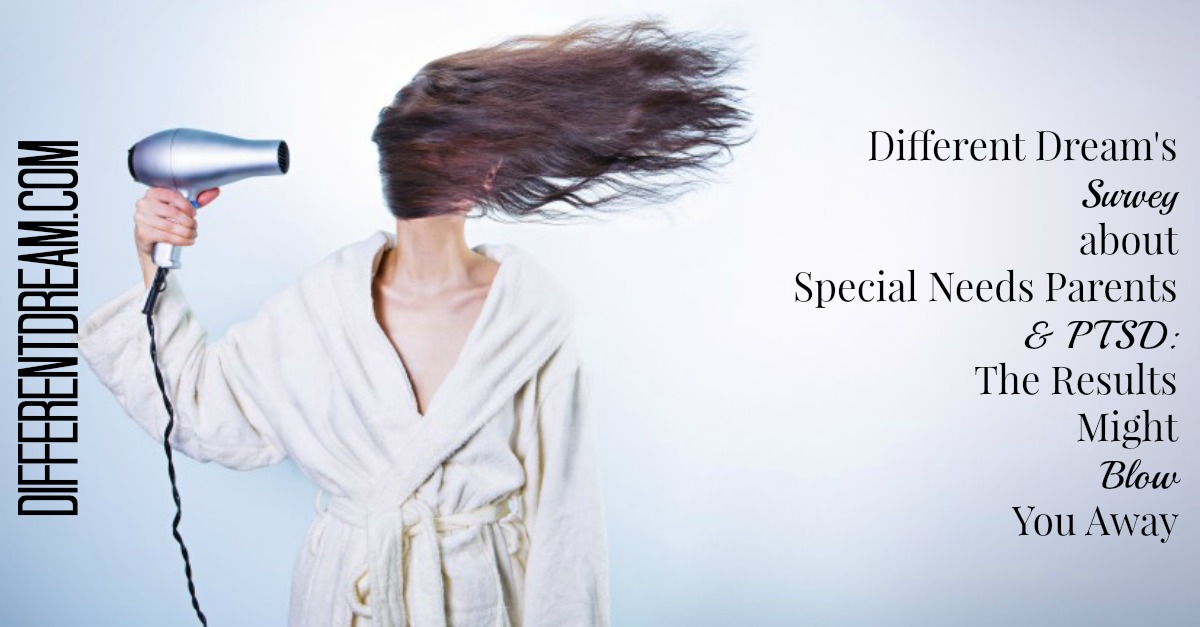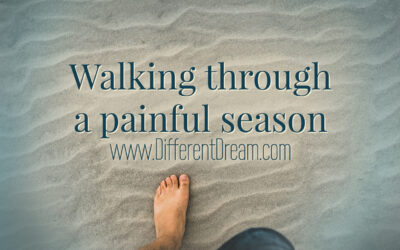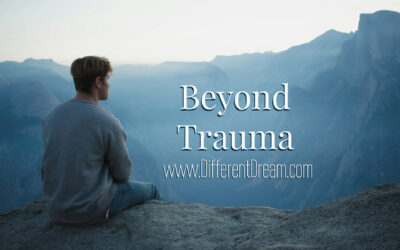Special Needs Parents and PTSD Survey Results

This post is the first in a series, based on the survey results, about special needs parents and PTSD. In future posts, you’ll hear from some of the people who participated in the survey–with their permission, of course. But for today, the series examines the results of the study.
Question #1
Do you think you have PTSD that was caused by your child’s special needs? All 49 participants answered this question. 90% said yes. 10% said no.
Question #2
Have you been diagnosed by a mental health professional or doctor with PTSD? Again, all participants answered this question. 30% answered yes, they have been diagnosed with PTSD by a mental health care professional. 70% said no.
Question #3
Have you received professional treatment for PTSD? Of the 47 people who answered this question, 30% said they have received professional treatment for PTSD, but 70% said they have not.
Question #4
Did professional treatment help you cope with your traumatic memories? 36 people answered this question, even though only 14 said they have received professional treatment. 30% (16 people) said treatment helped them cope. 70% (20 people) said it did not. Hopefully, we can presume those who actually received treatment were the ones who responded positively.
Question #5
When did your initial traumatic experience occur?
Here are the comments parents left in the box:
- Post adoption
- During hospitalization
- Right after she was born with her first diagnosis of cancer at 6 weeks of age.
- At birth
- Birth
- At birth with first TEF baby and in NICU with second TEF baby
- Yes during birth
- Before birth
- After birth
- Began when we adopted her from Russia.
- Premature birth, NICU
- After diagnosis of stroke when she was 8 months of age
- About a year after my first son was born. The first year is all about survival. When the dust starts to settle everything hit me like a brick. I managed to find a balance again. We found out we were pregnant with our second little boy. 24 weeks into pregnancy I found out he two would have the same disorder as his brother. Moments later the brick hit me again. It’s been over a year since the diagnoses and he is 8.5 months old. I’m still struggling.
- At birth and in the NICU for 6 weeks. (preemie, born 10 weeks early)
- I am raising my grandson, who is my son’s son, but due to circumstances at that time, he was not around. I was stunned that the mother wanted to give him up, so that was my first moment of panic. Then slowly realizing something was “not right” and thinking perhaps it was a connection/bond he was missing with his mother, I finally took him to the doctor where I left completely stunned by the diagnosis. Our lives took a sudden huge turn. I have learned a lot about PTSD. I know I probably need to take time and deal with my own, but I’m so involved in the caregiving process on so many levels.
- Before birth
- At birth, his first year spent mostly in hospital, his about 30 surgeries, for about the 4 years he stopped breathing about 6 times a day, the 2 times he almost died of kidney failure. Then my daughter started having supraventricular tachycardia episodes and mental health issues.
- When my son was admitted to the hospital at 5 days old
- With in the first month of my son’s birth
- diagnoses before birth
- NICU
- When my child was 5 weeks old
- At birth and many subsequent scary near losses
- Diagnosis and afterwards
- Birth, NICU, fighting for him during his first two years, heart surgery, and then bleeding
- I’m not sure if I can pinpoint the first experience. It could be the emergency C-section required at birth, the multiple ear infections as a baby, the increasing symptoms of autism in the first 2 years, the diagnosis at 27 months, or when it all finally hit me 3 years after diagnosis. I’m not positive I HAVE PTSD, but I do have major anxiety and clinical depression.
- In NICU
- At about age 2 when his behavior and CP were first diagnosed
- birth
- at diagnosis
- At diagnosis (newborn) and multiple times throughout growing years
- About three years after he was born, after the the calm after the storm
- At diagnosis
- Both at the time of my sons near drowning accident and once again last year when he stop breathing and had to be rushed to the hospital in an ambulance
- During his traumatic birth
- At diagnosis
- I believe the sudden death of my first husband had barely shown signs of what it did to me, then after remarrying our 16 month old was diagnosed with a brain tumor, after 18 visits to emerge starting at 16 weeks we begged for an MRI
- During NICU but didn’t get help until probably a year later
- When we met him in China (adoption)
- NICU after his adoption
- Before birth of my first child. Reactivated immediately after birth of my second (HIE) once she was taken away
- I would guess at birth, but maybe just along the way, sooo many things!
- Around diagnosis, at his first seizure
- Before child’s birth and then continued at her birth, NICU admission, heart failure, and chronic medical problems that ensued. It peaked when medical professionals accused us of making our child ill and reported us to state child protective services. Thankfully, their claims were quickly thrown out as invalid, but it amplified the PTSD.
- Before birth, NICU and subsequent surgeries and diagnosis
- At birth
Question #6
What is your child’s special needs diagnosis? The diagnosis ran the gamut from conditions caused by birth trauma, congenital abnormalities that required medical treatment or surgery at birth and a NICU stay, autism, epilepsy, developmental delays, RAD, and mental illness.
Question #7
Are you interested in contributing a blog post to DifferentDream.com’s upcoming series about special needs parents and PTSD? Of the 47 people who answered this question, 25 said yes. If you’re one of those people, thank you for your willingness to share your story. And watch your inbox for an email very soon about what to do next.
Did the Survey Results Surprise You?
Here’s what surprised me about these results….the number of parents dealing with PTSD for a long period of time without treatment or support. This makes me very sad because treatment is available and effective. So in addition to the stories survey participants will be contributing to this series, considerable time will be devoted to effective treatments and how to locate them.
So, did the survey results blow you away? Leave a comment about your reaction in the box below. Thanks!
Part 2: Special Needs Parents and PTSD–What About You Mom?
Part 5: PTSD in Parents–Moving from Negative to Positive
Part 7: PTSD in Parents of Kids with Special Needs: Visualization as a Coping Tool
Part 8: Newborns Feel Pain: The Headline that Almost Triggered My PTSD
Part 10: Why Kids with PTSD Need Mentally Healthy Parents
Part 11: PTSD and Special Needs Parents: Calling it Like It Is
Do you like what you see at DifferentDream.com? You can receive more great content by subscribing to the quarterly Different Dream newsletter and signing up for the daily RSS feed delivered to your email inbox. You can sign up for the first in the pop up box and the second at the bottom of this page.
By Jolene
Jolene Philo is the author of the Different Dream series for parents of kids with special needs. She speaks at parenting and special needs conferences around the country. She’s also the creator and host of the Different Dream website. Sharing Love Abundantly With Special Needs Families: The 5 Love Languages® for Parents Raising Children with Disabilities, which she co-authored with Dr. Gary Chapman, was released in August of 2019 and is available at local bookstores, their bookstore website, and at Amazon.
14 Comments
Trackbacks/Pingbacks
- Special Needs Parenting, Trauma, & PTSD | Special Connections - […] http://differentdream.com/2015/04/special-needs-parents-and-ptsd-survey-results/ […]
- Medical-Related PTSD Part Two: Special Needs Caregiver Trauma - […] Part 1: Special Needs Parents and PTSD Results […]
Submit a Comment
Subscribe for Updates from Jolene
Related Posts
How Do I Let Go of My Adult EA/TEF Child?
Valeria Conshafter explores the question “How do I let go of my adult EA/TEF child?” for EA/TEF Awareness Month.
The Physical Manifestations of Grief in Caregivers
Jolene explains how the heaviness of loss and sorrow can contribute to the physical manifestations of grief in caregivers.
Experiencing Post-Traumatic Growth while Raising a Child with Disabilities
Jolene explains the benefits of experiencing post-traumatic growth while raising a child with disabilities.






Dear Amy, Wow! You are dealing with a lot, and as you said it is ever-present, continuing trauma that wears a person down. If you’re on FB, you might want to join a closed FB group that launched today, Sept. 1, for parents of kids with special needs who are dealing with trauma and stress. To join, you first need to register with Key Families, the organization hosting the group, here: http://www.keyministry.org/find-a-community-online/. Then go to this FB group (https://www.facebook.com/groups/1611201765795195/) and click the “join” button. Someone will approve your request and then you can join the discussion. This week, people are briefly introducing themselves and explaining why they joined the group. We’d love to have you! Jolene
I have been telling my doctor for months that I am losing my mind, my control, my ability to captain this ship. I get pats on the back and told that I am doing an amazing job and no one could manage what I manage any better, or probably as well as I do. AHEM. Does any sound come out of my mouth when I speak? lol. DROWNING, NOT WAVING HERE! I recognize what I’m experiencing as PTSD from being diagnosed from a traumatic event long before I had children. – you know, a couple of lifetimes ago. I had no idea it could be caused by caring for a chronically ill child(ren). Everything I can find talks about single events such as injuries or illnesses with treatments/cures. I can find a lot about caring for children with autism. My 10 yr old daughter has Ehlers-Danlos, Dysautonomia/POTS, MCAD. She’s been home-bound three years. She is starting her fourth school year partially home-bound. I have a son who just turned 3 who also has Ehlers-Danlos, though they don’t like to diagnose children prior to the age of 5, and Intra-Cranial MCAD. I am waiting on the referrals to endocrinology, a geneticist, neurology, and immunology to start piecing his puzzle together.
There’s no, “I flash back to the time he couldn’t use his legs and his head hurt so badly they just called it a migraine.” That was 3:30 this morning, that was last Tuesday, that was two weeks ago, that was four days out of the first week of May…. I can’t say, “I avoid driving past the dance studio because my daughter had to give up her dream of dancing since simply standing up causes her heart rate to increase 70 bpm and her bp to bottom out, not to mention the extraordinary pain she is in or the constant dislocations in her hips, shoulders, wrists, knees….” It’s a constant barrage… We can go five days with nothing more than chronic pain and headaches, or there can be dislocations, tachycardia, my son randomly loses the use of his legs when he’s walking along and will face plant with no warning, suddenly scream out because of the pain spiking in his head for no apparent reason, my daughter can be in the middle of a sentence and just pass out, she can be dead asleep and start projectile vomiting…. it’s relentless. And at the moment, there is no treatment, there is no cure, there’s no light at the end of the tunnel, there are no answers, no “one day when this is all over” to look forward to…. so it’s not really “POST Traumatic Stress Syndrome”…. Not sure what you might call it. “Constant Traumatic Stress Syndrome”? But this series is as close as I have found to relating to our situation. Thank you for writing it.
Stephanie, you describe the feeling of aloneness and trauma parents of kids with special needs often experience. I’m so glad Different Dream has been a source of reassurance and belonging for you. Jolene
It does seem to not only be a Different Dream but at Different World a lot of the time! 19 emergency surgeries for my son prior to 3 years old and the triggers that come from everywhere and nowhere. Years of functioning with no emergencies and adapting to the reality but then out of the clear blue back in the stuck mode of hopelessness and helplessness and shear terror that comes when the dose of reality is more than usual. I remember when the Twin Towers fell thinking that is how I feel every time my son has an emergency or I sense things are heading in that direction. Thanks for this blog, it really allowed me to know I am not alone in my feelings and this Different Journey in life. Knowing there was peace for a while gives me hope there will be peace again.
Thanks for sharing your story, Karol. It’s good to hear of someone who received successful therapy and is able to manage new traumas when they come. All the best.
Thanks for sharing your story, Karol. It’s good to hear of someone who received successful therapy and is able to manage new traumas when they come. All the best.
I have been professionally diagnosed with PTSD. I have seven children. The three youngest are adopted and have special needs and my 6th child died in a tragic accident. I have had extensive trauma therapy, including EMDR. I can definitely say that the therapy was helpful. I continue to struggle some with PTSD symptoms, especially in the last few months, as my 14 year old son has met with some pretty severe challenges. However, I recognize the symptoms and an well equipped to deal with them, thanks to therapy.
I have been professionally diagnosed with PTSD. I have seven children. The three youngest are adopted and have special needs and my 6th child died in a tragic accident. I have had extensive trauma therapy, including EMDR. I can definitely say that the therapy was helpful. I continue to struggle some with PTSD symptoms, especially in the last few months, as my 14 year old son has met with some pretty severe challenges. However, I recognize the symptoms and an well equipped to deal with them, thanks to therapy.
You are welcome, Dottie. As you said, this is a huge problem that must be brought to light. If there’s any way we could work together to accomplish what needs to be done, I would love to work with you.
Jolene
Thank you for bringing this topic into the light. As a medical professional I have seen the panic in the eyes of the parents of my patients. But then I made my journey to the other side of the bed as a parent of a chronically ill child. I’ve been saying for years that this is a very real issue and that more research needs to be done. I’m considering obtaining my doctorate so I can do more research on this topic. It is personal and real. Thank you for opening the door for so many who are not only dealing with a chronically ill child but also struggling as a caregiver.
Hi Dan,
So sorry you didn’t see it in time. A dad’s perspective would be awesome. But as you said, I’m glad the survey was done.
Hi Dan,
So sorry you didn’t see it in time. A dad’s perspective would be awesome. But as you said, I’m glad the survey was done.
I’m a special needs parent diagnosed with ptsd related to my son’s conditions and surgeries. Wish I had seen the survey but grateful that you did it.
I’m a special needs parent diagnosed with ptsd related to my son’s conditions and surgeries. Wish I had seen the survey but grateful that you did it.